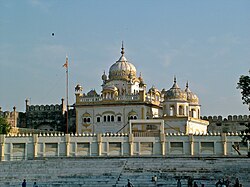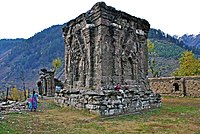List of temples in Lahore
Temples in Lahore
لہور لاہور | |
|---|---|
 | |
 Temples in Lahore Location in Pakistan | |
| Coordinates: 31°32′59″N 74°20′37″E / 31.54972°N 74.34361°E | |
| Country | |
| Province | |
| Elevation | 217 m (712 ft) |
| Time zone | UTC+5 (PKT) |
| Postal code | 54000 |
| Dialling code | 042[1] |
| Lahore Cantonment is a legally separate military-administered settlement. | |
| Part of a series on |
| Hinduism |
|---|
 |
Lahore is the capital of Punjab, the most populous province of Pakistan. It has a rich cosmopolitan history and was the principal city of the vast plain of the entire Punjab region for many centuries, and was the capital of the Sikh Empire of Maharaja Ranjit Singh until the mid-1850s when it was conquered by the British. Before the partition of British India in 1947, Lahore had a large Hindu, Sikh and Jain population. In 1941, 64.5% of the population of Lahore was Muslim, while about 36% was Hindu or Sikh.[2] At that time, the city contained numerous Hindu temples, Jain temples, and Sikh gurdwaras. The overwhelming majority of Lahore and West Punjab's non-Christian minority population fled to India at Partition, while East Punjab was similarly depopulated of almost its entire Muslim population. For example, on the eve of Partition, Amritsar was about 49% Muslim, whereas in the 1951 census, the figure had dropped to only 0.52%,[3][4] while Ludhiana was 63% Muslim prior to Partition, but 97% Hindu and Sikh in the 1961 census.[5] As a result of religious demographic changes and political tensions, almost all Hindu and Jain temples have been abandoned in Lahore, although several important Sikh shrines continue to operate.
The condition of temples in Lahore is not good, it is not like that the city lack temples but they are not maintained so much as Hindus migrated from Lahore in 1947 en masse. In 1992 after demolition of Babri Masjid, in Pakistan especially in Lahore, temples were attacked and destroyed, many temples were completely destructed.[6]
Hindu temples
[edit]
Only two Hindu temples are currently functional in Lahore.[7]
- Krishna Mandir, Lahore at Ravi Road,[8]
- Valmiki Mandir, Lahore or Neela Gumbad Mandir, only functional temple in lahore besides Krishna temple[7]
The following Hindu temples lay abandoned or were destroyed:
- Akbari Mandi Temple
- Arya Samaj Temple
- Bhairav ka Asthan, Ichhra
- Bal Mata Temple at Shah Almi
- Chand Raat Temple, Ichhra
- Doodhwali Mata Tample (between Shah Almi and Lohari gate)
- Lava Temple (son of Ram– According to Hindu legend, Lahore is named after him)[9]
- Mahadev, there is a Bhairav temple also
- Mandir Wachhowali
- Mela Ram Talao Temple
- Model Town B Block Temple
- Model Town D Block Temple
- Ramgali Temple
- Rattan Chand Temple, Old Anarkali and its former temple tank currently a grassy field known as Azad Park.
- Sheetla Temple, Mohalla Chiri Marian, Shah Almi
- Tulsi Mandir, Mohalla Chiri Marian, Shah Almi
- Aitchison College Temple
- Bhadrakali Temple, Gulzar Colony (Now a School)
- Old Basuli Hanuman Temple, Old Anarkali
- Devi ka Asthan, Lohari Gate
- Lala Nihal Chand Temple (Abandoned)
Jain temples
[edit]All of Jain temples in Lahore are either abandoned or destroyed.
- Jain Śvetāmbara Temple with Shikhar, Thari Bhabrian
- Jain Digambar Temple with Shikhar, Thari Bhabrian
- Jain Śvetāmbara Dada Wadi (Mini Temple), Guru Mangat in Lahore Cantt
- Jain Digambar Temple with Shikhar, Old Anarkali (Jain Mandir Chawk[10])
- Aitchison College Jain Mandir
Sikh gurdwaras
[edit]
Several of Lahore's gurdwaras remain functional, including:
- Samadhi of Ranjit Singh
- Gurdwara Dera Sahib
- Gurdwara Janam Asthan Guru Ram Das
- Shaheed Ganj Bhai Taru Singh (on the site of the former Shaheed Ganj Mosque)
- Gurdwara Shahid Ganj Singh Singhania
The following gurdwaras are abandoned:
- Gurudwara Guru Nanak Garh Sahib
- Gurudwara Baoli Sahib
- Gurudwara Chaumala
- Gurudwara Chhevin Patshahi, Mozang
- Gurdwara Lal Khoohi
- Gurudwara Janamsathan Bebe Nanki
See also
[edit]References
[edit]- ^ "National Dialing Codes". Pakistan Telecommunication Company Limited. Archived from the original on 3 September 2014. Retrieved 28 August 2014.
- ^ "Forced Migration and Ethnic Cleansing in Lahore in 1947, Ishtiaq Ahmed, 2004" (PDF). Retrieved 24 April 2012.
- ^ Talbot, Ian; Tatla, Darshan Singh (2006). Epicentre of violence: partition voices and memories from Amritsar. Permanent Black. ISBN 978-81-7824-131-9.
- ^ Ispahani, Farahnaz (2 January 2017). Purifying the Land of the Pure: A History of Pakistan's Religious Minorities. Oxford University Press. ISBN 978-0-19-062167-4.
- ^ Virdee, Pippa (February 2018). From the Ashes of 1947. Cambridge University Press. p. 138. ISBN 978-1-108-42811-8.
- ^ "The fate of Lahore's Hindu temples show the city's shift from a cosmopolitan to monolithic culture".
- ^ a b Only two functional Hindu temples in Lahore
- ^ One Hindu temple in Lahore, and no crematorium Archived 1 July 2006 at the Wayback Machine
- ^ "Hindu, Sikh temples in state of disrepair". Daily Times. 16 April 2004. Archived from the original on 2 March 2012. Retrieved 24 April 2012.
- ^ "TEPA to remodel roads leading to Jain Mandir Chowk". Daily Times. 1 June 2007. Archived from the original on 2 March 2012. Retrieved 24 April 2012.

